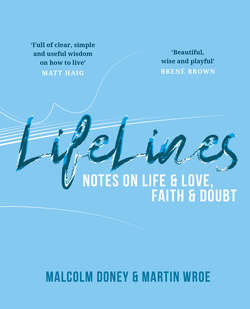Читать книгу LifeLines - Malcolm Doney - Страница 31
На сайте Литреса книга снята с продажи.
Оглавление22
Make a habit of it
It’s Sunday morning, and some ancient programming hardwired deep inside tells someone to go to church.
Perhaps it would be a big decision if they decided not to do it, but in recent decades millions of people have made that very decision. They have reprogrammed themselves: they enjoy a divine lie-in on Sunday morning; they drink coffee and read the paper, catch up on Facebook, call relatives, go to the supermarket, hang out.
In the UK the numbers participating in institutional religion are falling, steadily. It’s the default position. No religion is the new religion.
But still, around the world, a lot of people continue to wear the religious habit. In Kampala and Manila, in Buenos Aires and Bethlehem, in Ho Chi Minh City and in Holloway, north London... on Sundays, people do church.
On Friday, Muslims say prayers at the mosque.
On Saturday, Jews walk to synagogue.
It’s a ritual. It’s a habit.
Taken together, our habits shape the lives we live. And good habits are a good habit. When life gets tough, they can help us find hope. ‘Hope begins in the dark,’ writes Anne Lamott. ‘The stubborn hope that if you just show up and try to do the right thing, the dawn will come.’1
U. A. Fanthorpe in her poem ‘Atlas’, shows how the ordinary, overlooked habits of the everyday can become a beautifully engineered pattern, strong enough to hold up an entire life:
There is a kind of love called maintenance Which stores the WD40 and knows when to use it. 2
She goes on to talk about how this hands-on, daily detail, love – leaves notes for the milkman; answers letters; makes dental appointments; reviews the car insurance. Like Atlas, she says, this ‘upholds/The permanently rickety elaborate/Structures of living...’
Any healthy life needs good habits. Although in religion, habit is often called ritual. Like our other daily habits – cleaning our teeth in the bathroom each morning – once we’re in the place of worship, the programming takes over.
Christians, for example, sing songs, make a confession, receive bread and wine, say prayers, give money away, listen to a talk, wonder what it’s about, hope it will soon be over. Many of them have undergone rituals called baptism, or confirmation – public commitments that they will try and follow the way of Jesus of Nazareth.
The scholar Karen Armstrong writes:
‘Religion is not about accepting 20 impossible propositions before breakfast, but about doing things that change you. It is a moral aesthetic, an ethical alchemy. If you behave in a certain way, you will be transformed.’ 3
Like other habits, we choose some rituals after deliberation, and some we do automatically, without thinking. But all of them contribute to the kind of people we want to be. Our habits inform how we live, without us realising it.
Rituals can be a performance that needs no explaining. Like a mantra, the repetition itself is the meaning. ‘Ritual is poetry in action,’ said Rabbi Chaim Stern.4
The best kind of rituals are a really good habit. ‘We are what we repeatedly do,’ Aristotle put it a millennia and a half ago. ‘Excellence is not an act, but a habit.’5
